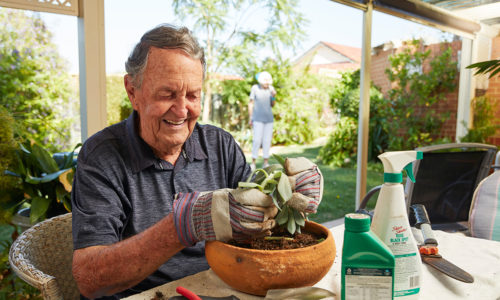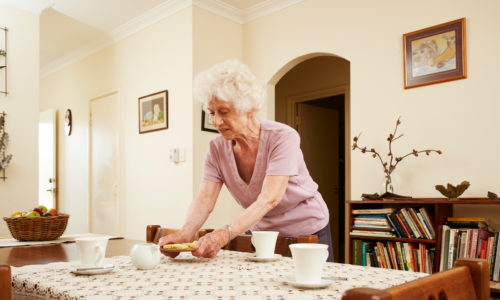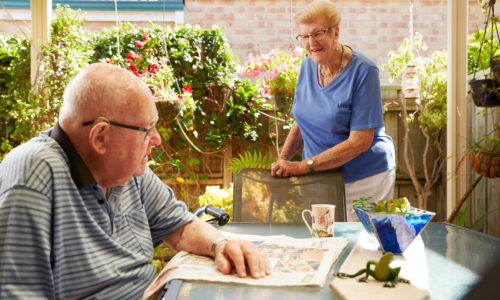Our Bunbury and Perth Retirement Villages
Retirement Village Downloads
Our Retirement Village FAQs
Who owns and manages the retirement villas?
Catholic Homes owns and operates four independent living villages, as well as residential aged care and home care services. The organisation is an incorporated association (est. 1965) and a registered charitable institution.
Catholic Homes is governed by its Board and managed by a highly experienced executive team with a broad range of qualifications and expertise including business, nursing and health services, accounting and community development.
What age does the oldest resident of a couple have to be to live in a Catholic Homes retirement village?
To qualify for residency, at least one resident in a villa must be aged 55 years or older.
All residents should be capable of independent living in the village.
Why a lease for life?
Leases are widely used by retirement village operators in Western Australia as they are the most practical and cost effective method for residency contracts.
Leases are widely used by retirement village operators in Western Australia as they are the most practical and cost effective method for residency contracts.
A lease gives residents the security of tenure they reasonably expect and ensures that the whole village is maintained to a continually high standard by Catholic Homes. This type of agreement also keeps the development costs down as there are no separate titles and no GST payable on the lease. Stamp duty is not applicable for an independent living village under current legislation. This is subject to change.
A long-term lease also provides a secure and legally binding interest that is protected by the Residency Agreement, the Retirement Villages Act 1992, Fair Trading (Retirement Village Code) Regulations and a Memorial which is lodged over the title of the village protecting your rights under the Retirement Villages Act.
The village cannot be sold for any other purpose than as a retirement village so your investment is secure.
What are the ongoing costs to residents?
Each residence contributes a proportion of the village operating costs. This proportion is based on the size of the residence, the number of bedrooms in your villa. The amount of this fortnightly payment is presented at an Independent Living Villa Residents’ Budget Meeting usually held before the end of each financial year.
Independent Living residents are invited to comment on and ask questions about the proposed budget and fortnightly fees payable for the next financial year.
Fees are payable fortnightly in advance. For the current fortnightly fees payable at our villages please contact the ILV Coordinator for the current rates.
Some components of the village operating costs are described below and a more comprehensive list is provided in the Residency Agreement:
• Grounds maintenance to the common areas
• Shopping bus service
• Building maintenance, including external painting
• Community centre maintenance
• Salary expenses
• Energy costs to common areas
• Water rates and consumption/taxes/fees/rubbish removal
• Insurances for buildings, public liability and worker’s compensation for employees of the village
• Security patrols overnight.
Items not covered in the fortnightly fees which the resident is responsible for:
• Contents insurance and worker’s compensation insurance if you wish to employ your own tradespeople or domestic assistance
• Personal use of gas, electricity, phone, internet, streaming services and any other services provided to the residence
• Rates are currently exempt and are controlled by State Government law in relation to the churches and charitable or “not for profit” sector. You would be responsible to pay rates if the law is changed in future and, in this event, normal concessional rebates applicable on an individual basis would apply to you.
Is there a garage or carport?
Most of our villages provide either a carport or garage for residential use. However, at Servite in Joondanna thereare only 10 carports for 24 villas.
Visitor parking is available at most Catholic Homes sites. Visitor parking at Servite is on the street.
Are there any other services available in the various villages?
Some optional services may be available in our various sites including meals, and use of the Community Centre.
However, please refer to the Optional services schedule in your Agreement for Villa Residency for up to date information.
Is there security at in the various retirement villages?
Yes, a security service patrols the village twice at random times during the night.
EMERGENCY SITUATIONS
If you have a life-threatening emergency in your villa, you are advised to call 000. The operator will ask which service you require – ambulance, police or fire. Please nominate the service you need and the operator will confirm your address so the service can be sent to you as soon as possible.
What if I decide to ‘sell’?
As the villas are held under a lease, they are not actually “sold” in the legal meaning of the word. Rather, the lease is terminated and the villa re-leased to the new resident. When the villa is re-leased, it is usually at the current market value.
When the “New Entry Contribution” is paid by the new resident, Catholic Homes is entitled to receive the following from you before paying your “Repayment Amount”:
• Market value increase or decrease
• Refurbishment costs
• Other costs due and payable to Catholic Homes
Am I allocated an aged care place if I live in an independent living village?
Current legislation deems that independent living village residents do not have automatic entry to an aged care residence.
Do I purchase or lease a villa at one of Catholic Homes’ sites?
Residents of our independent living villas receive a security of tenure through a lifetime lease for the exclusive occupancy of the residence (often called a “lease for life”).
This is subject to the rights of termination in accordance with the Retirement Villages Act 1992 and the Agreement for Villa Residency. Residents are welcome to use the shared areas and shared facilities on a shared basis with other residents. The “Entry Contribution” is the current sale price payable for a villa within the village setting.
Do I own the villa?
Residents don’t own the asset but may benefit from any growth in its value when their villa is “sold”. When you purchase a lease for life villa,your payment means that when there is capital growth on the property upon re-sale, you share in this growth. This is sometimes called a “capital share lease” arrangement.
Under the Independent Living Village Agreement, residents receive the benefit of a proportion of capital growth, subject to conditions, upon re-leasing. This does vary between villages and organisationsand you should check to see if anagreement allows you to benefit from capital growth.
What maintenance am I responsible for?
You are responsible for keeping the interior of the villa, its additions, including plumbing fixtures, doors and locks, glass and other fixtures in or belonging to the villa in good and tenantable repair and condition. See items mentioned in Schedule 5 - Excluded Items in theAgreement for Villa Residency.
In addition, you maintain any private outdoor areas and gardens not forming part of the shared areas.
Can I have a pet at a Catholic Homes Retirement Village?
Pets may be permitted at the discretion of Catholic Homes and must be authorised in writing.
Incoming residents must abide by and sign a Pet Agreement Form, as your pet should not intrude on your neighbour’s amenity. Assistance andguide dogs are permitted.
Can I receive Home Care Services?
Yes, all independent living residents can receive Home Care services in their villa and are welcome to choose their own provider.
Catholic Homes offers a highly competitive, personalised Home Care service. Contact 1300 244 000 or homecare@catholichomes.com for more information.
Under what circumstances can an Agreement for Villa Residency be terminated?
The Agreement for Villa Residency may be terminated in the following circumstances:
1. The resident wishes to terminate
2. The resident dies, or if the residence is leased to more than one resident when the sole surviving resident dies
3. Due to health reasons it is not suitable for the resident to reside in the village
4. The resident is in serious default under the Lease and fails to rectify that default
5. Circumstances exist, as provided for in the Retirement Villages Act 1992, which entitle termination.
In cases numbered 3, 4 and 5, except where the resident agrees to terminate, the termination must be made by an order of the State Administrative Tribunal.
Re-sale marketing rights
Catholic Homes markets the residence directly or by its agent. The villa can only be marketed in accordance withthe marketing provisions of the village scheme.
The current market value is determined by Catholic Homes’ real estate appraisal before the villa is offered for sale. The value will be determined taking into account the general real estate market at the time, the villa’s position within the village and any refurbishments carried out by either Catholic Homes or previous resident.




